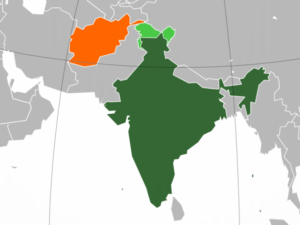By Alishbah Syed
Pakistan, a nation brimming with great potentials and challenges, is actively committing towards achieving the UN Sustainable Development Goals (SDGs). It is actually one of Pakistan’s biggest strengths; a firm commitment to the SDGs. It was among the first countries to endorse the 2030 Agenda and has since integrated the goals into its national development strategy. This commitment is further solidified by the establishment of a dedicated Parliamentary SDGs Secretariat, a unique initiative highlighting Pakistan’s serious approach. But all that optimism doesn’t come without Pakistan’s own fair share of issues that make maintaining these commitments challenging.
Out of the 17 SDGs of UN that Pakistan is committing to, this article will discuss about the Goal 9: Industry, innovation and infrastructure.
The 9th Goal
This crucial goal for Pakistan strives to promote inclusive and sustainable industrialization, foster innovation and build resilient infrastructure. Pakistan’s position within Sustainable Development Goal (SDG) 9, “Industry, innovation and infrastructure,” is one of immense potential waiting to be unleashed.
Firstly, Pakistan boasts a young and growing population. This human resource is valuable for a burgeoning industrial sector. This demographic surplus, coupled with government initiatives to increase female participation in the workforce, can fuel a more inclusive industrial base. And even before that, the potential of innovation remains high with fresh minds coming into the scene. Secondly, Pakistan’s strategic location on trade routes as a crossroad of Central Asia, the Middle East and South Asia presents a unique opportunity for establishing itself as a regional economic hub. This is especially in the business of transit trade. By developing efficient and sustainable infrastructure, Pakistan can attract foreign investment and become a key player in global supply chains.
However, to unlock this potential, Pakistan needs to address some key challenges. One major hurdle is the current state of infrastructure. Unequal access to reliable electricity, transportation networks and communication technology hinders industrial growth. Investing in renewable energy sources and modernizing infrastructure will not only create jobs but also pave the way for a more sustainable and competitive industrial sector as in trend with the global world.
Furthermore, fostering a culture of innovation is critical. Currently, Pakistan’s research and development spending remains low. Pakistan can create an environment that fosters innovation by prioritizing science and technology education, supporting research institutions, and encouraging entrepreneurship. This will allow Pakistani industries to develop cutting-edge solutions and compete effectively in the global market.
In conclusion, while challenges exist, Pakistan’s position within Goal 9 is one of immense potential.
Industry: Unleashing the Forces of the Industry 4.0
The Fourth Industrial Revolution (Industry 4.0) is transforming global economies with its focus on automation, digitalization, and interconnectivity. Pakistan can leverage Industry 4.0 principles to achieve Sustainable Development Goal (SDG) 9.
Pakistan’s ambitious “Digital Pakistan” initiative serves as the cornerstone for embracing Industry 4.0. This program actively promotes the adoption of automation, digitalization, and data-driven processes across the industrial landscape. By implementing these principles, Pakistan can aim to achieve significant progress in several key areas like increasing efficiency to boost production, improved resource management as this translates to a more sustainable industrial sector of SDG, and elevated product quality through digital tools and data analysis provide valuable insights for optimizing production processes.
Additionally, the Pakistani government is actively encouraging the adoption of advanced technologies like robotics and Artificial Intelligence (AI) into manufacturing processes. This shift towards “Smart Manufacturing“ holds immense potential for achieving SDG 9’s targets. Resource and energy efficiency can be achieved through AI analysing production data and recommend adjustments to optimize energy consumption and minimize waste. Robots can handle dangerous tasks, improving worker safety and reducing resource misuse. Innovation and competitiveness are also key benefits by allowing for rapid prototyping and testing of new product designs. This empowers Pakistani industries to compete effectively in the global market.
Through these initiatives, Pakistan is already witnessing the practical implementation of Industry 4.0 principles in specific sectors. The textile industry is a vital contributor to Pakistan’s economy. Government initiatives are promoting the adoption of Industry 4.0 technologies like smart textiles with embedded sensors that monitor product quality and performance. Additionally, digital design tools are being introduced to streamline production processes and enhance product design capabilities. Government’s focus has also been shifted towards E-commerce growth due to the synergy it has with the value of SDG 9. The government’s active support for e-commerce platforms not only benefits consumers with wider product availability but also empowers small and medium-sized enterprises (SMEs) to participate in the digital economy. This aligns perfectly with SDG 9’s focus on promoting inclusive and sustainable industrialization by providing a platform for smaller players to thrive.
In conclusion, Pakistan’s embrace of Industry 4.0 principles, coupled with initiatives like “Digital Pakistan,” holds the potential to revolutionize its industrial sector. By harnessing the power of automation, digitalization and data-driven processes, Pakistan can not only achieve significant economic growth but also make substantial progress towards the crucial goals outlined in SDG 9. This journey towards a more sustainable and technologically advanced future is well underway, with exciting possibilities for the years to come.
Innovation: Modernisation, Education and Research as a Cornerstone
Pakistan’s commitment to achieving innovation hinges on three qualities: modernization, education, and research. Modernizing infrastructure, with a focus on reliable electricity, internet, and transportation, lays the foundation for innovation. Investing in education, particularly STEM fields, equips the future workforce with the skills needed for the said innovation by cultivating the minds of tomorrow. Finally, boosting R&D spending fosters the development of home grown solutions, fuelling the engine of innovation.
But Pakistan also recognizes the need to go beyond just R&D investment. Technology incubators and accelerators provide crucial support to start ups while universities are encouraged to bridge the gap between research and practical applications. Public-private partnerships leverage private sector expertise and resources to ensure commercially viable solutions with real-world impact.
By effectively integrating these elements, Pakistan can create a fertile ground for innovation. Modernized infrastructure provides the platform, a skilled workforce fuels development, and robust research fuels the engine of innovation. This synergistic approach paves the way for a more sustainable, efficient, and competitive industrial sector, unlocking Pakistan’s true potential as a future leader in technological advancements.
Infrastructure: A Roadmap to Connectivity
Pakistan’s dedication to achieving UN Sustainable Development Goal (SDG) 9 places significant emphasis on infrastructure development. This focus recognizes infrastructure as the roadmap to connectivity, a crucial element for industrial growth and overall economic progress.
Upgrading Pakistan’s infrastructure goes beyond just roads and bridges. It encompasses reliable access to electricity, a robust telecommunication network with high-speed internet connectivity, and efficient transportation systems. This interconnected infrastructure serves as the backbone for industrial activity, fostering communication, collaboration and the seamless flow of goods and services. Reliable electricity ensures uninterrupted operations within industries, while high-speed internet allows for real-time data exchange and integration with global markets. Additionally, efficient transportation networks connect businesses to raw materials, markets, and trade routes, promoting domestic and international trade.
Pakistan is not only focused on building infrastructure but also on building it sustainably by the virtue of SDG 9. This means prioritizing renewable energy sources like solar and wind power to generate electricity for powering industries. Sustainable infrastructure practices also involve ensuring efficient water management systems and eco-friendly transportation solutions to minimize environmental impact.
The practical implementation is National Transport Policy and Special Economic Zones (SEZs). Developing a robust and sustainable infrastructure network is a key focus. The National Transport Policy aims to improve internal connectivity by investing in transportation infrastructure. This will not only enhance mobility but also create opportunities for efficient movement of goods and services. The establishment of SEZs offers attractive incentives for businesses, particularly those focusing on high-tech industries. This not only promotes economic growth but also encourages the development of infrastructure within these zones, fostering connectivity and attracting further investment.
Additionally, broadband internet access across the country is essential for widespread adoption of Industry 4.0 technologies. Initiatives like laying down fiber optic cables and promoting internet affordability help in bridging the digital divide and ensure equitable access to the benefits of technological advancements.
By investing in infrastructure development, Pakistan is strategically positioning itself to achieve the goals of SDG 9. Improved connectivity fosters a dynamic industrial environment, attracting investment and propelling economic growth. It empowers businesses to compete effectively in the global market and creates a platform for innovation and technological advancements. This focus on infrastructure development paves the way for a more prosperous and sustainable future for Pakistan.
Challenges, Concerns and Solutions
Despite significant strides in infrastructure development, innovative initiatives and embracing Industry 4.0, Pakistan faces hurdles. Bridging the digital divide in rural areas is crucial for inclusive growth. Additionally, ensuring cybersecurity and attracting foreign investment in advanced technologies require constant attention. Moreover, ethical considerations regarding potential job displacement due to automation and equitable access to opportunities need to be addressed.
Additionally, a crucial challenge lies in “globalization.” While Industry 4.0 offers immense potential, it can lead to homogenization. Pakistan needs to balance adopting global best practices with fostering domestic innovation that addresses its specific needs. This is where “frugal innovation” comes in. This approach focuses on developing cost-effective, locally relevant technological solutions that address local challenges within the framework of Goal 9.
Pakistan’s entrepreneurial spirit can be harnessed through this. Examples include open-source industrial platforms for small and medium-sized enterprises (SMEs), renewable energy solutions tailored to Pakistan’s context, and “Agri-Tech” that merges digital tools with traditional agriculture.
The benefits of Goal 9 like Industry 4.0 can risk exacerbating gender inequalities. Women need to be active participants. Promoting gender equality requires initiatives like STEM education for girls, skills development programs for women, and encouraging women-led tech startups.
Finally, as data becomes central to Goal 9, ensuring responsible data governance is critical. Building a robust framework with clear data privacy laws, promoting data literacy, and investing in data security infrastructure are all essential steps on Pakistan’s journey towards achieving Goal 9.
In short, Pakistan’s path towards achieving Goal 9 is paved with both progress and challenges.
Conclusion: The Road Ahead
Pakistan’s commitment to Industry 4.0, innovation, and infrastructure development reflects a comprehensive approach towards achieving Goal 9. By harnessing these forces, Pakistan can propel itself towards a future marked by a robust and sustainable industrial base, a skilled workforce equipped for the digital age, and a well-connected infrastructure network. This journey requires continued investment, collaboration across sectors and a focus on inclusive development to ensure everyone benefits from the progress.







